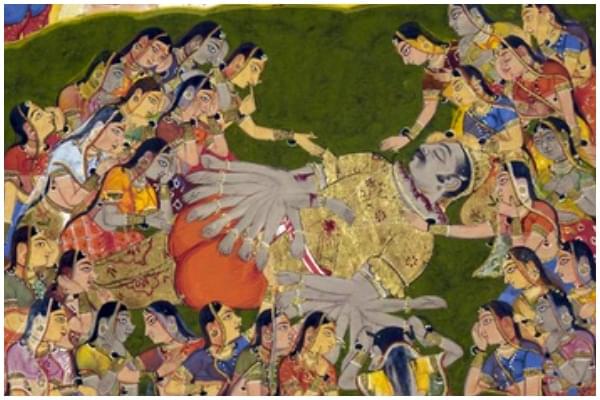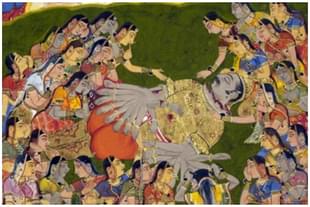Culture
Ravana’s Death And Mandodari’s Lamentation
Bibek Debroy
Oct 08, 2019, 11:26 AM | Updated Nov 01, 2024, 09:07 PM IST
Save & read from anywhere!
Bookmark stories for easy access on any device or the Swarajya app.


Valmiki Ramayana and Mahabharata are both kavya (poetry). But the two respective poets, Krishna Dvaipayana Vedavyasa and Valmiki, differed in their inclinations.
Vedavyasa was matter of fact. Barring some exceptions, he described individuals and events.
Valmiki was lyrical. Like Kalidasa, he excelled in descriptions of nature.
Of course, the story of Ravana’s death isn’t described only in Valmiki Ramayana. In Sanskrit, there are other renderings (Yoga-Vasistha Ramayana, Adhyatma Ramayana). But Valmiki was Valmiki. He was the original poet (adi kavi), who composed the first shloka, in the anushtubh metre.
Poetry is difficult to translate and the metrical quality is impossible to capture in translation. I will not try to explain the structure of the anushtubh metre, beyond stating that each quarter of a line (pada) has exactly eight syllables (aksharas). (There is more to it.)
Ravana had several wives. The most important was Mandodari.
In Yuddha Kanda of Valmiki Ramayana, after Ravana was killed by Rama, there is a chapter on Mandodari’s lamentation.
This is one of the most beautiful chapters in the entire text.
हा राजन् सुकुमारं ते सुभ्रु सुत्वक्समुन्नसम्। कान्तिश्रीद्युतिभिस्तुल्यमिन्दुपद्मदिवाकरैः। किरीटकूटोज्ज्वलितं ताम्रास्यं दीप्तकुण्डलम्। मदव्याकुललोलाक्षं भूत्वा यत्पानभूमिषु। विविधस्रग्धरं चारु वल्गुस्मितकथं शुभम्। तदेवाद्य तवैवं हि वक्त्रं न भ्राजते प्रभो। रामसायकनिर्भिन्नं रक्तं रुधिरविस्रवैः। वीशीर्णमेदोमस्तिष्कं रूक्षम् स्यन्दनरेणुभिः।
“Alas! O king! Your delicate and shining face has excellent eye-brows and a prominent nose. Its beauty and charm are like that of the moon, the lotus or the sun. The complexion of your face is like that of copper. You were radiant ear-rings, with radiant crowns at the top. In drinking halls, your eager eyes used to roll with intoxication. You are handsome, wearing many kinds of garlands. Your smile was lovely and your conversation was enchanting. O lord! However, your face is now no longer as radiant as it used to be. Mangled by Rama’s arrows, it is red, with flows of blood. It is smeared with the fat from your shattered heads and rough because of the dust raised by chariots.”
Without the Sanskrit, this is how Valmiki Ramayana describes the other wives, after Ravana’s death:
“They saw the immensely radiant Ravana lying down on the ground. He was gigantic in size and great in bravery. He was like a mass of dark collyrium. They suddenly saw their husband lying down on the ground, in the dust of the battle.
“Like severed forest creepers, they fell down on his body. One embraced him with a great deal of respect, another wept. One embraced his feet, another clung to his neck. Another raised her hands up and writhed around on the ground. On seeing the face of the slain one, another was filled with confusion. One took up his head on her lap. Another looked at his face and cried. Like dew on a lotus flower, another wiped his face with her tears.”
In the text, Mandodari’s lamentation is described after that of the other wives.
Let me continue with Mandodari’s lamentation. “You were known as Vaishravana’s younger brother. Anxious at hearing your name, the rishis, the gods of the earth, the illustrious gandharvas and the charanas fled in different directions. Full of prosperity and valour, you invaded the three worlds.
“You could not be resisted. Yet, you have been slain by a man wandering around in the forest. Assuming any form at will, you roamed around in the dominion of men. In the field of battle, I do not believe that Rama performed this act.
“In earlier times, you conquered your senses and vanquished the three worlds. As remembrance of that, the senses have defeated you now. Maithili is no match for me in nobility of birth, beauty or gentleness. But because of your confusion, you did not comprehend whether she was superior to me or equal to me.
“In every way, among all beings, there is a reason for death. As for you, Maithili is the reason for your death. Maithili will find pleasure with Rama, freed from grief. I am limited in fortune. That is the reason I am immersed in this terrible ocean of grief.
“I have sported with you in Kailasa, Mandara, Meru and the grove of Chaitraratha, in beautiful vimanas that were unmatched in their prosperity. Clad in colourful garlands and garments, I have seen many regions. With your death, I am now deprived of all those objects of pleasure.
“You were famous for your strength and manliness and I should not grieve over you. But because of my feminine nature, my mind is whirling around in pity. You have accepted your good deeds and bad deeds and have attained your own destination. Since I am miserable at being separated from you, I am grieving about myself.
“You possess the complexion of a dark cloud. You are attired in yellow garments. You wear auspicious armlets. Why are you lying down, covered in blood, with your entire body stretched out? I am afflicted by grief. You seem to be asleep. Why are you not replying to me? You were immensely valiant and accomplished. You did not run away from an encounter. Why are you not replying to me?
“Shame on my heart! It is not shattering into a thousand fragments. You are dead and the consequence is that I am afflicted by grief.’
This should really be read in the Sanskrit and this time of the year is an opportune time to start.
Bibek Debroy is a noted Economist. His 10-volume translation of The Mahabharata is one of the most seminal works in contemporary Indology. He was a member of the Swarajya Advisory Board.





